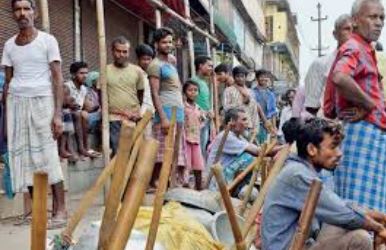Unraveling India’s Labor Paradox
The Indian labor market presents a perplexing paradox: a shortage of skilled blue-collar workers, particularly in sectors like construction, coexists with high unemployment rates and stagnant wages. Recent reports highlight the scarcity of plumbers, carpenters, masons, and welders, attributed in part to urban-to-rural migration and departures to Gulf countries seeking better remuneration and working conditions.
The Wage Conundrum
A key factor contributing to this shortage is the reluctance of employers to offer skilled workers fair compensation commensurate with their expertise and the rising cost of living. This situation is further complicated by the prevailing low wages in the labor market. Several factors contribute to this phenomenon:
- Productivity and Skill Development: The lack of adequate skill development initiatives has resulted in lower labor productivity, which in turn depresses wages.
- Labor Surplus: The abundance of available labor due to limited job opportunities creates a “reserve army of labor,” exerting downward pressure on wages.
- Capital Substitution: The increasing substitution of capital for labor further contributes to the labor surplus, reinforcing the low-wage environment.
Sociological Bias and Skill Recognition
The undervaluation of skilled blue-collar work stems from a sociological bias that often disregards the specialized knowledge and expertise required for these professions. This bias leads employers to offer subsistence wages rather than acknowledging the true value of these skills.
Towards Wages of Dignity
The transition from subsistence wages to wages that afford a dignified living is imperative. Concerns about a potential wage-price spiral are overstated, considering the modest growth in real per capita consumption expenditure in both rural and urban India. Policy interventions should focus on enhancing labor productivity through targeted skill development programs.
Skill Development: A Critical Imperative
The recently released Annual Survey of Unincorporated Enterprises reveals a concerning trend: stagnant or even negative growth in gross value added per worker in real terms. This underscores the urgent need to revamp skill development policies. The allocation of a mere ₹3,520 crore for the Ministry of Skills Development and Entrepreneurship in the Interim Budget raises questions about the government’s commitment to bridging the skills gap.
Policy Solutions for a Thriving Labor Market
The upcoming budget presents a crucial opportunity to address these challenges. Several policy measures can be implemented to foster quality employment and skill enhancement:
- Production-Linked Incentives (PLIs): Introducing PLIs in labor-intensive sectors and modifying existing schemes can incentivize job creation and skill development.
- Addressing Capital Intensity: The capital-intensive nature of India’s growth necessitates a reevaluation to ensure a more balanced approach that prioritizes labor-intensive sectors.
- Challenging Social Norms: Deep-seated social attitudes that perpetuate low wages and fuel labor shortages must be actively challenged.
Conclusion
India’s labor market faces a multifaceted challenge, where skill shortages coexist with unemployment and stagnant wages. By implementing a comprehensive and well-calibrated set of policy interventions, the government can create a more equitable and productive labor market that benefits both workers and employers. The forthcoming budget should prioritize skill development, incentivize job creation, and address the root causes of low wages to unlock the full potential of India’s workforce.

Sunil Garnayak is an expert in Indian news with extensive knowledge of the nation’s political, social, and economic landscape and international relations. With years of experience in journalism, Sunil delivers in-depth analysis and accurate reporting that keeps readers informed about the latest developments in India. His commitment to factual accuracy and nuanced storytelling ensures that his articles provide valuable insights into the country’s most pressing issues.



